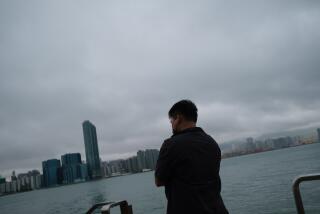Chinese Troops Arrive in Hong Kong
- Share via
HONG KONG — In China’s first expression of sovereignty before it takes control of Hong Kong on July 1, an advance unit from the People’s Liberation Army crossed the border Monday to prepare its new home base.
On the way, the Chinese convoy rumbled down the same streets that filled eight years ago with 1 million people marching to protest that army’s brutal suppression of demonstrators in Beijing’s Tiananmen Square.
The 40 officers and soldiers, unarmed but in uniform, are here to lay the groundwork for stationing an additional 10,000 troops here after China regains control of Hong Kong in 10 weeks. The PLA will replace British forces, who will depart the day of the hand-over, but is charged with an additional duty the British left to the police: keeping the peace.
The PLA’s most difficult task, though, will be to reassure wary Hong Kong residents; its presence embodies their greatest fears about life under Chinese rule.
Wong Mak-au, 42, lingered after his lunch hour to watch the convoy of camouflage-painted trucks go by. “I don’t like to see those soldiers here,” he said. “It gives me the creeps.”
The convoy drove 20 miles from the border to what will be its new headquarters at Prince of Wales Barracks--now housing the British garrison--and to a low-key welcome by the commander of British forces, Maj. Gen. Bryan Dutton.
“This is an historic moment for both British and Chinese armed forces,” Dutton said with military courtesy and a stiff upper lip. He ended his statement with the Chinese word for welcome--huanying--and a handshake.
Maj. Gen. Zhou Borong, the deputy commander of the future garrison who led Monday’s arrival, showed he felt right at home in media-conscious Hong Kong, nudging Dutton to repeat the handshake for the benefit of photographers.
“With 71 days to go, our work enhances the cooperation and understanding of both sides,” Zhou said, waving to reporters.
The 40-strong contingent has been training for more than a year for life in Hong Kong, juggling lessons in Cantonese and karaoke singing--a favorite Hong Kong pastime--with lectures in Hong Kong etiquette. Lesson one: Don’t spit in the street.
To help ease their adjustment, an elite regiment of British soldiers is making the awkward switch from adversaries to escorts. The Black Watch, a kilt-wearing Scottish regiment, is showing the soldiers the ropes at British headquarters.
For the Black Watch, it will be the second time it has given away a British colony: Black Watch troops turned off the lights in India in 1947.
Watching Monday’s historic welcome was Black Watch Pvt. Douglas Maxwell, 19, standing at full attention, a gentle breeze ruffling his tartan kilt. He said he had never before saluted a Chinese officer, “But we’ve been told to salute them today.”
The PLA will not be asked to wear kilts, play bagpipes or eat haggis; it has a separate kitchen with four huge woks and will live apart from the remaining British troops. But its members are free to use facilities at the newly refurbished $10.6-million barracks.
Chinese officials have agreed that the soldiers will follow Hong Kong laws, but the garrison’s general will outrank incoming Chief Executive Tung Chee-hwa. Technically, national security, along with foreign affairs, lies outside the purview of Hong Kong’s leaders.
The soldiers’ arrival marks the first time in Hong Kong’s 150 years of British rule that Chinese troops have been resident in the colony. But the PLA is firmly entrenched in Hong Kong in other ways.
After Beijing ordered the military to pay its own way a decade ago, the PLA began to convert its swords into market shares. From the top floors of the posh Peninsula Hotel, the owners of which are partners of the PLA in Beijing, one can see a giant harbor-front neon sign advertising Sanjiu Pharmaceuticals, a PLA-owned drug company.
But the new soldiers have been banned by Beijing from Hong Kong bars and businesses. They won’t be allowed to leave their compound without an escort or read local newspapers, which Beijing considers politically polluting.
On salaries of $65 a month for a platoon soldier and $157-$197 for the forces’ commander--less than minimum wage for a Hong Kong maid--they are unlikely to be sampling much of the nearby strip bars and restaurants of the bustling Wanchai neighborhood, currently hosting several thousand U.S. sailors on R & R.
Cleaning staff at the Prince of Wales Barracks turned out in their aprons to watch Monday’s brief welcome ceremony, and construction workers laboring on the harbor front nearby stopped work and gawked.
“I wanted to see the Chinese soldiers,” said Bo Siu-lam, 51, wearing a construction helmet over a wide-brimmed straw hat. “But the changeover won’t affect people like me. It doesn’t matter who the general is.”
More to Read
Sign up for Essential California
The most important California stories and recommendations in your inbox every morning.
You may occasionally receive promotional content from the Los Angeles Times.










